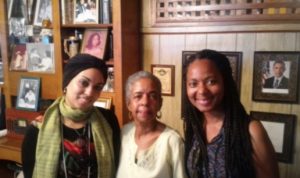Blog Blog Day 1 – June 25, 2018 Blog Day 2 – June 26, 2018 Blog Day 3 – June 27, 2018 Blog Day 4 – June 28, 2018 Blog Day 5 – June 29, 2018 Blog Day 6 – June 30, 2018 Blog Day 7 – July 1, 2018 Blog Day 8 – July 2, Read More ...

ICRPS 2018 Summer Institute | Tuskegee, AL | June 24-July 07
"Social Justice, Rural and Natural Resource Policy"
Day 6 – “Bombingham”
Written by: Miquel Correa (Autonomus University of Barcelona) & Jasmine Ratliff (Tuskegee University)
“To the privileged, equality is a sacrifice.” These are the words one of our wise tour guides, Barry, would like for us to reflect on today and every day. He would like for us to pass on the message to be mindful of your privileges and make sacrifices to spread justice for all.
When Birmingham’s Mayor Randall Woodfin’s Liason, Felicia Mitchell, gave us a warm welcome, she mentioned how the city has had many nicknames from “Magic City”, “Pittsburg of the South”, to “Bombingham” and then later the “Mecca of the South”. Rightfully, “Bombingham” was the one that stayed on the forefront of our minds throughout the trip.
16th Street Baptist Church – “The People’s Church”
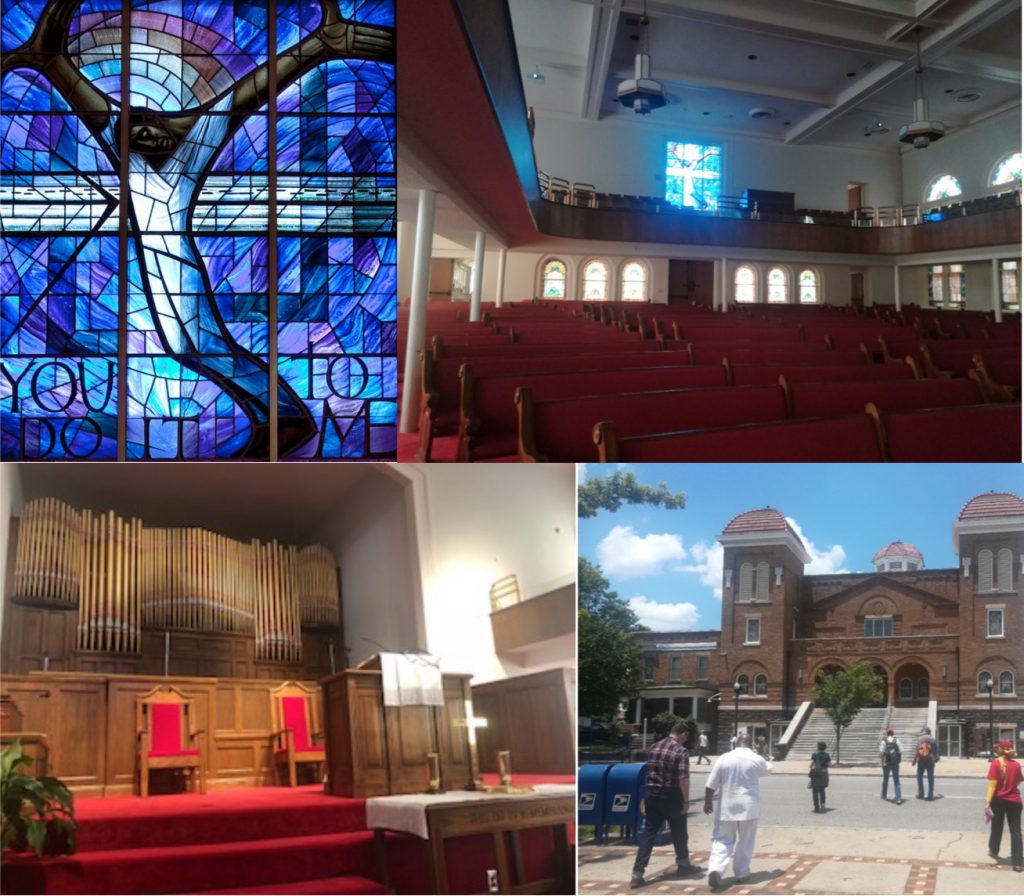
14-year-olds Addie Mae Collins, Denise McNair, Carole Robertson, and 11-year-old Cynthia Wesley, were killed on September 15, 1963 in the 16th Street Baptist Church bombing where Dr. Martin Luther King Jr. performed the eulogy. Dr. King also presented his “I Have a Dream” speech to the congregation here before unveiling it to the world at The Lincoln Memorial.
It was over a decade after the bombing that ring leader, Klu Klux Klansman, Robert “Dynamite Bob” Chambliss, was convicted of first degree murder. Despite FBI agents “losing” almost all of the physical evidence post-trial, in 2001 and 2002 respectively, Thomas Edwin Blanton, Jr. and Bobby Frank Cherry were convicted by then lead prosecutor, U.S. Attorney for Alabama’s Northern District, Doug Jones.
Today, not only did we visit a church that President Obama named a nationally historic landmark, but we visited a place that was used to plan strategies and demonstrations, it was the center of social change.
Speaking of change –
“I am of the firm belief that public servants can do great things for the people. There are too many politicians who let their egos get in the way and play to their bases. We need politicians who focus on the issues people care about.” –Senator Doug Jones
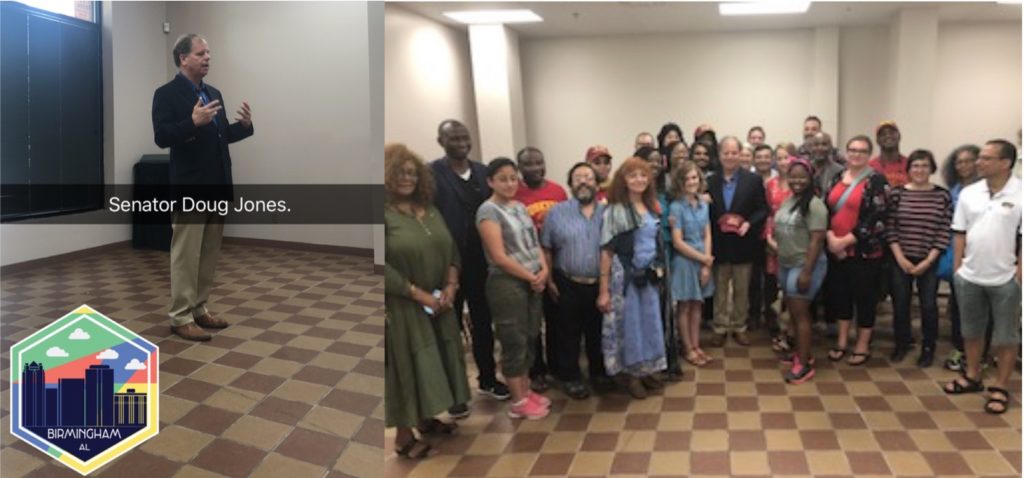
Meeting with Senator Doug Jones was both hopeful and helpful. Hopeful in a sense that Alabama is shifting in a way that will be beneficial to all of its residents, even rural. Helpful in a way of giving us face-to-face access with one of the legislative leaders who has the power to propose policy.
Senator Jones shared with us his personal connections to the four U.S. Senator Committees he has been appointed to and then his top three issues he’s currently working towards- expanding Medicaid, getting grants for much needed sewage infrastructure upgrades, and broadband expansion. We were then able to ask questions regarding his past time as an attorney and his current commitment to rural areas, more specifically Tuskegee and people placed development over the historically chosen place based development.
Birmingham Civil Rights Institute
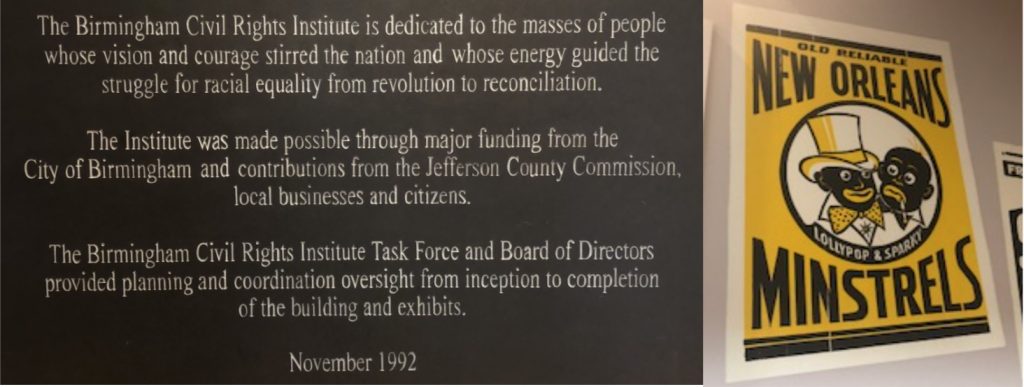
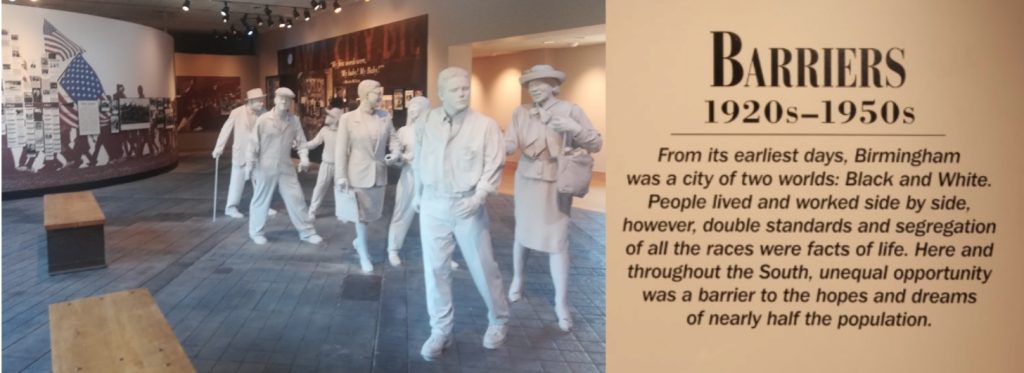
The entry way is deliberately lined with plants of rosemary used for amnesia treatment to jog the memory and hopefully engrain the lessons learned into the memory of the millions of visitors. The walkway of bricks leading to the entry tells the lyrics of songs “Jesus Loves the Little Children” & “We Shall Overcome” with red, yellow, black, and white bricks interlocked in intricate patterns. As we emotionally progressed through the Barriers, Movement, Confrontation, and Human Rights galleries, the stories of so many Civil Rights warriors were captured in our hearts.
Birmingham Fish Market
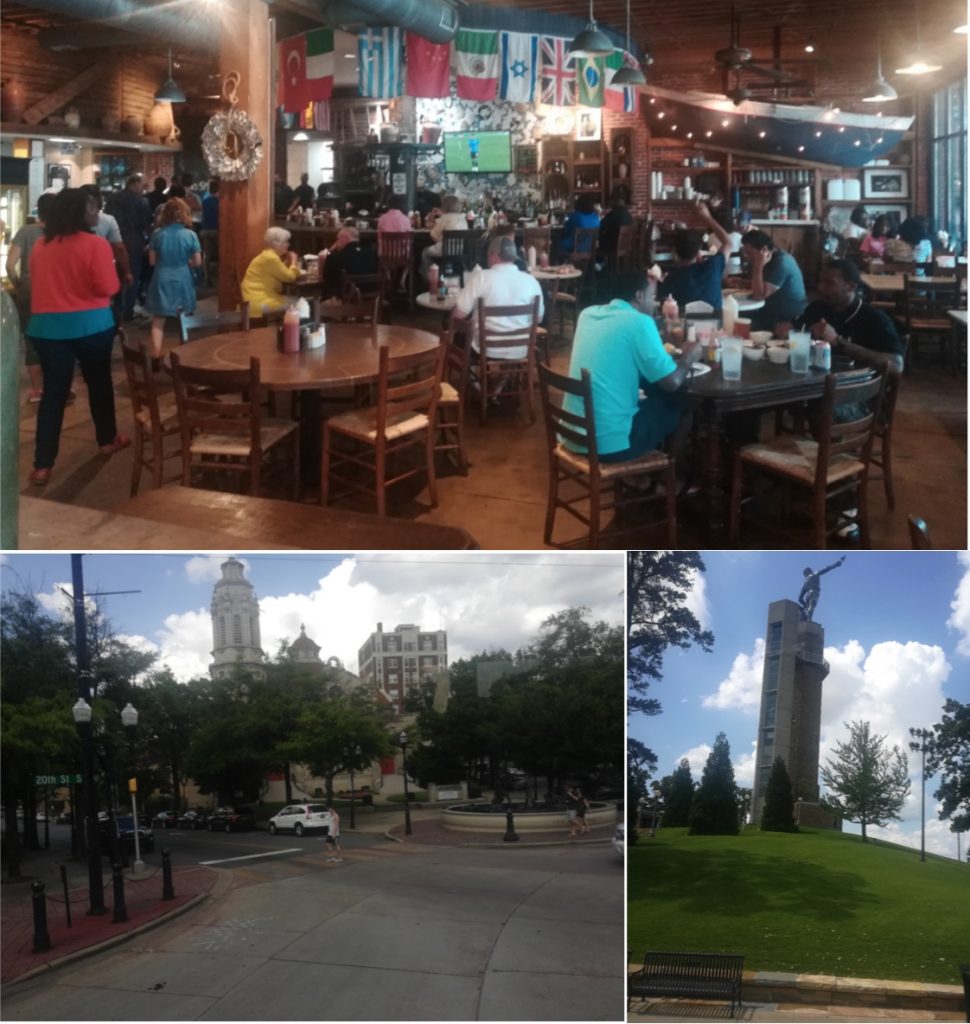
The afternoon in Birmingham concluded with a well-planned lunch at The Fish Market. As we boarded the bus “home”, Barry guided us on an unforgettable driving tour around the city. The stories that Barry told us, regarding the statue Vulcan, the “heaviest corner on Earth” or the soon-to-be-restored Gaston Motel, were extremely interesting. The tour took us back to 20th century-Birmingham, remarking its industrial past and the on-going fight for civil rights, which gives this southern city its sense of uniqueness. There could not have been a better end to our trip to Birmingham, and we are so grateful to Barry for his dedication to us during the whole day.
On our way back “home” to Tuskegee after two long and inspiring days, we still had time to stop at The Outlet Shops of Grand River, where some scholars would find nice bargains and others would opt for refreshments while recalling past ICRPS experiences.
We would like to leave you with the words that Dr. Martin Luther King Jr. said to the families of the four girls killed in the 16th Street Baptist Church Bombing. These words are so relevant currently, remembering the dark times of yesterday as we strive to ensure policies are inclusive and implemented with equality today.
“I like to believe that the negative extremes of Birmingham’s past will resolve into the positive and utopian extreme of her future; that the sins of a dark yesterday will be redeemed in the achievements of a bright tomorrow.” – Dr. Martin Luther King Jr.
Written by: Sherine Salmon & Dalal Alkordi
 How many bubbles do you think is in that bar of soap? How many jelly beans do you think is in the jar? These were the type of questions in the literacy test for African Americans when they tried to register to vote (intimidation). Day 5 of ICRPS focused on the historic sites of Selma and Epes. March 7, 1965 in Selma, Alabama, dubbed ‘Bloody Sunday’, saw the historical march along the Edmund Pettus Bridge that provided the right for blacks to vote. This march was motivated by their constant denial to partake in the ‘democratic’ system of the United States of America, along with the shooting and subsequent, death of Jimmie Lee Jackson. The walk across the bridge led us to the site, now called the Civil Rights Memorial Park, where police brutality was enacted upon the activists. ‘Someone marched for me’ were the lyrics that accompanied the tune that played throughout the visit at The National Voting Rights Museum. The museum sought to highlight the work of the foot soldiers – the unsung heroes who never counted their lives too important in light of the greater goal – whose unwavering stance proved successful. Their sacrifice could only be rewarded by the announcement of the 1965 Voting Rights Act, signed on August 6 of the said year. The visit to the Selma Interpretative Center, afforded us the opportunity to meet Mayor Darrio T. Melton, who gave us insight on the current projects of the town as well as the needs of the community. The visit to this center further highlighted key players in the movement towards equal rights to vote for African Americans. The joint efforts of the Courageous Eight (Mrs. Amelia Boynton, Mrs. Marie Foster, Mr. Ernest Doyle, Rev. John D. Hunter, Mr. James Gildersleeve, Rev. Henry Shannon, Mr. Ulysses Blackmon, and Dr. Frederick D. Reese) of the Dallas County Voters League (DCVL), the Southern Christian Leadership Conference (SCLC) and Student Nonviolent Coordinating Committee (SNCC) led to the evolution of social systems. We were then hosted for lunch at the Wallace Community College.
How many bubbles do you think is in that bar of soap? How many jelly beans do you think is in the jar? These were the type of questions in the literacy test for African Americans when they tried to register to vote (intimidation). Day 5 of ICRPS focused on the historic sites of Selma and Epes. March 7, 1965 in Selma, Alabama, dubbed ‘Bloody Sunday’, saw the historical march along the Edmund Pettus Bridge that provided the right for blacks to vote. This march was motivated by their constant denial to partake in the ‘democratic’ system of the United States of America, along with the shooting and subsequent, death of Jimmie Lee Jackson. The walk across the bridge led us to the site, now called the Civil Rights Memorial Park, where police brutality was enacted upon the activists. ‘Someone marched for me’ were the lyrics that accompanied the tune that played throughout the visit at The National Voting Rights Museum. The museum sought to highlight the work of the foot soldiers – the unsung heroes who never counted their lives too important in light of the greater goal – whose unwavering stance proved successful. Their sacrifice could only be rewarded by the announcement of the 1965 Voting Rights Act, signed on August 6 of the said year. The visit to the Selma Interpretative Center, afforded us the opportunity to meet Mayor Darrio T. Melton, who gave us insight on the current projects of the town as well as the needs of the community. The visit to this center further highlighted key players in the movement towards equal rights to vote for African Americans. The joint efforts of the Courageous Eight (Mrs. Amelia Boynton, Mrs. Marie Foster, Mr. Ernest Doyle, Rev. John D. Hunter, Mr. James Gildersleeve, Rev. Henry Shannon, Mr. Ulysses Blackmon, and Dr. Frederick D. Reese) of the Dallas County Voters League (DCVL), the Southern Christian Leadership Conference (SCLC) and Student Nonviolent Coordinating Committee (SNCC) led to the evolution of social systems. We were then hosted for lunch at the Wallace Community College.
Our trip had a very special stop after lunch at the Jackson House which held the spirit of Martin Luther King Jr. and his importance to the voting rights act; this is the place where he had meetings and spent his time while in the south. Each corner and room of this house had an interesting story. After the amazement with the Jackson house, we had the pleasure to visit the church where Dr. King worshipped and had some speeches, the Brown Chapel AME Church. It was established in 1908 and interestingly was built by black architects. This church played a vital role in the civil rights movement and nonviolence revolution, especially in the march of Bloody Sunday. Since 1960 people started gathering inside the church for these causes. In 1997, the church was named a historic landmark.
Despite the long day and the heat on our heads, we were so excited for our second trip to Epes, Alabama. Once we made it to the Federation of Southern Cooperatives Training Center, we were warmly welcomed by Marcus Bernard, the director, and his employees. We enjoyed wonderful food while learning about the different kinds of collaboration and assistance done by the Cooperatives with regard to land loss issues. The cooperative as a nonprofit organization addresses small black farmers’ business struggles. The cooperatives’ main principles are (land, labor, capital, and, management). The documentary viewed acknowledged that African American farmers are in need of more knowledge, technical assistance and how the cooperatives make decisions to help create new jobs. We also discussed and explored information on the socio economic conditions that depress almost all the Black Belt Counties. We felt proud at the end of the day when we learnt about the successful collaboration between Tuskegee University and the Federation (zero sum game).
Photo display of the ‘Bloody Sunday’ march; Selma Interpretative Center
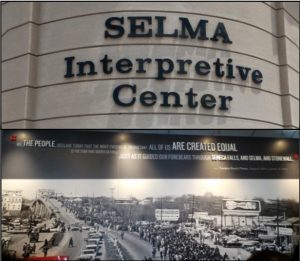
Foot molds of actual foot soldiers of the ‘Bloody Sunday’ march; The National Voting Rights Museum
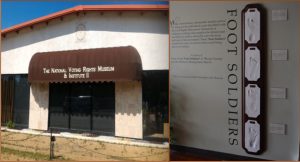
Monuments of 4 of the Courageous Eight along with the founders of the Civil Rights Memorial Park
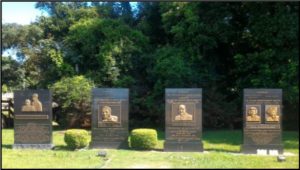
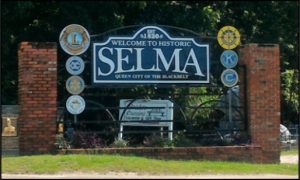
Edmund Pettus Bridge
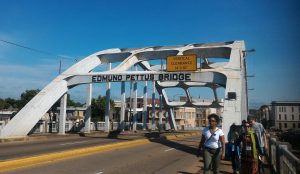
From Left: Dalal, Joanna Jackson, Sherine; The Jackson House
